Posted by Mónica Amador-Jiménez
13 June 2022Monica Amador & Naomi Millner
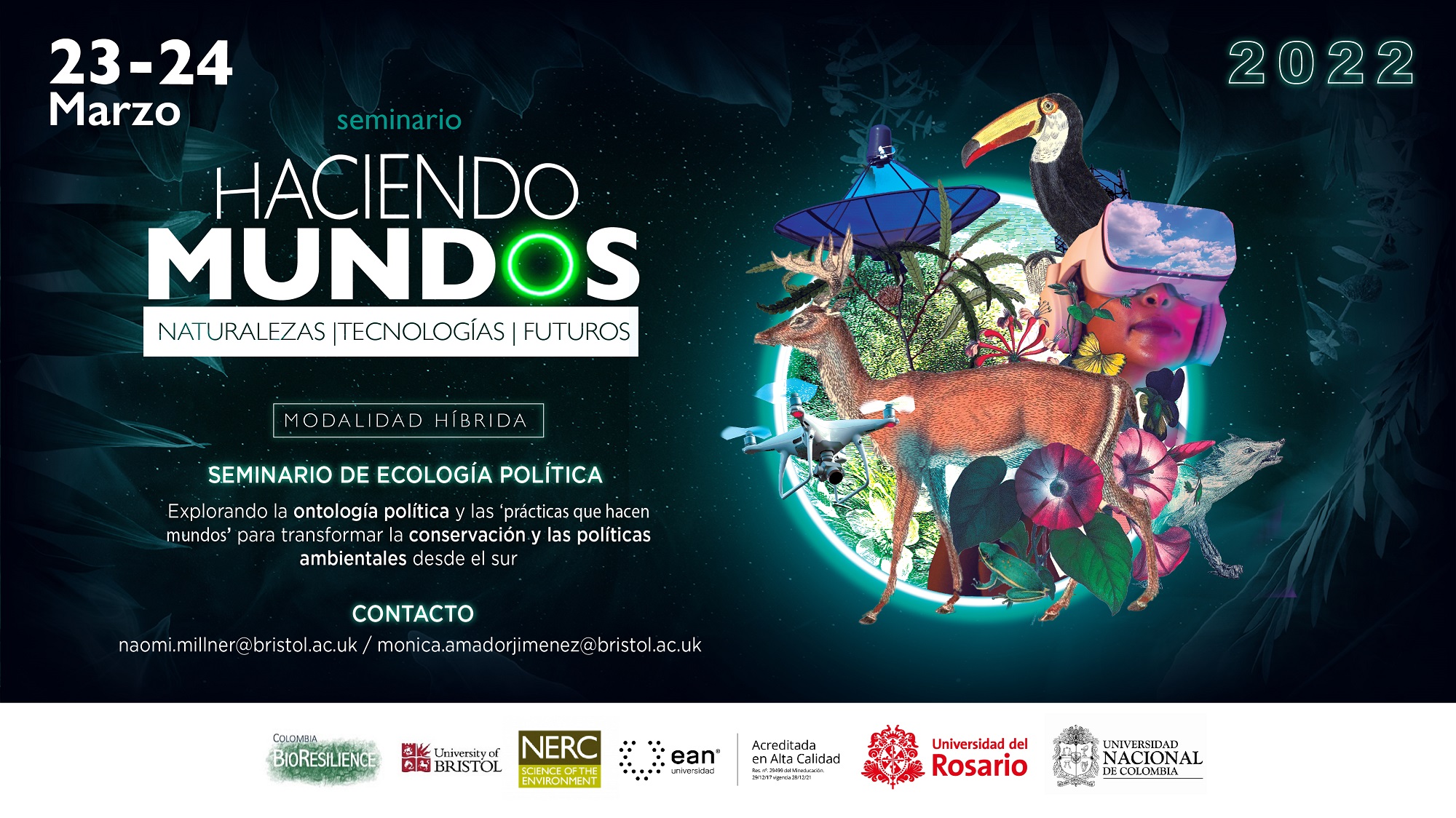
The 23th and 24th of march 2022 saw the international seminar Making Worlds: Nature, Technologies, and Futures, take place in Bogota-Colombia. This seminar, organised by Naomi Millner and Monica Amador, in collaboration with the Universidad EAN, the Universidad Nacional, The Universidad del Rosario and the BioResilience project (funded by NERC-AHRC), brought together scholars, activists, students and environmental organisations to explore environmental issues and environmental politics. Through seminars, lectures and discussions, we explored the profound environmental problems that are pushing the planet to the tipping-point, with an emphasis on the place of alternative ways of knowing the world, Indigenous thinking, and technologies, in moving beyond multiple forms of crisis. We drew in particular on new conversation in political ecology and theories of political ontology, covering topics as diverse as the rights of nature and the use of drones in conservation.
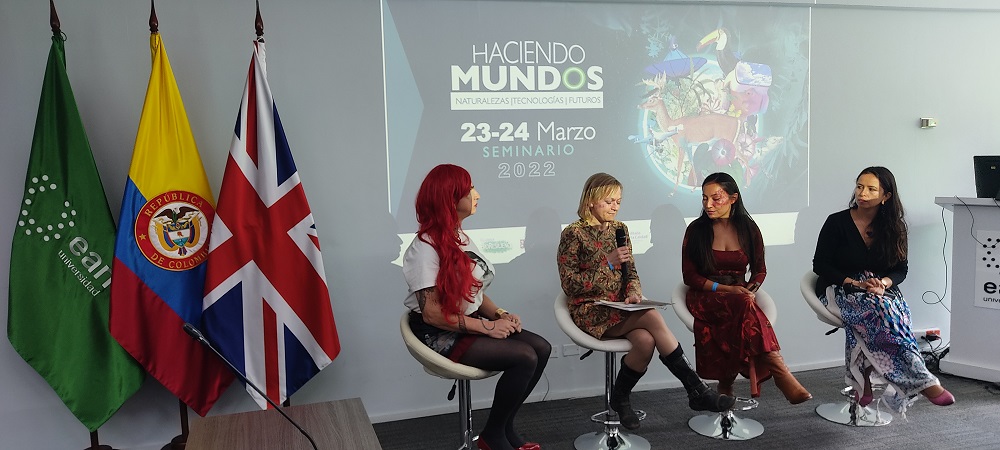
Inaugural Lecture. From left to right: Brigitte Baptist (EAN), Naomi Millner (UBristol), Monica Amador (UBristol) and Sara Vera (EAN)
From widespread environmental commentaries, we already know that changes are needed in the production model, alongside an energy transition from fossil fuels to clean energies, and the intensification of environmental conservation actions, to move toward sustainable futures. However, the academics, activists, intellectuals and artists gathered at the seminar addresses wider logics and social-environmental relations that have led to crisis and widespread extraction, seeking to transform wider epistemological paradigms. In the seminar, we explored the different practices (material and semiotic) that participate and make ‘worlds’, and that manifest a deep socio-environmental intertwining beyond binaries of “nature” vs “culture”. We also considered the wider plurality of cosmologies in which “nature” is experienced through different relationalities, so transforming the very nature of “nature” as we in the modern world have imagined it.
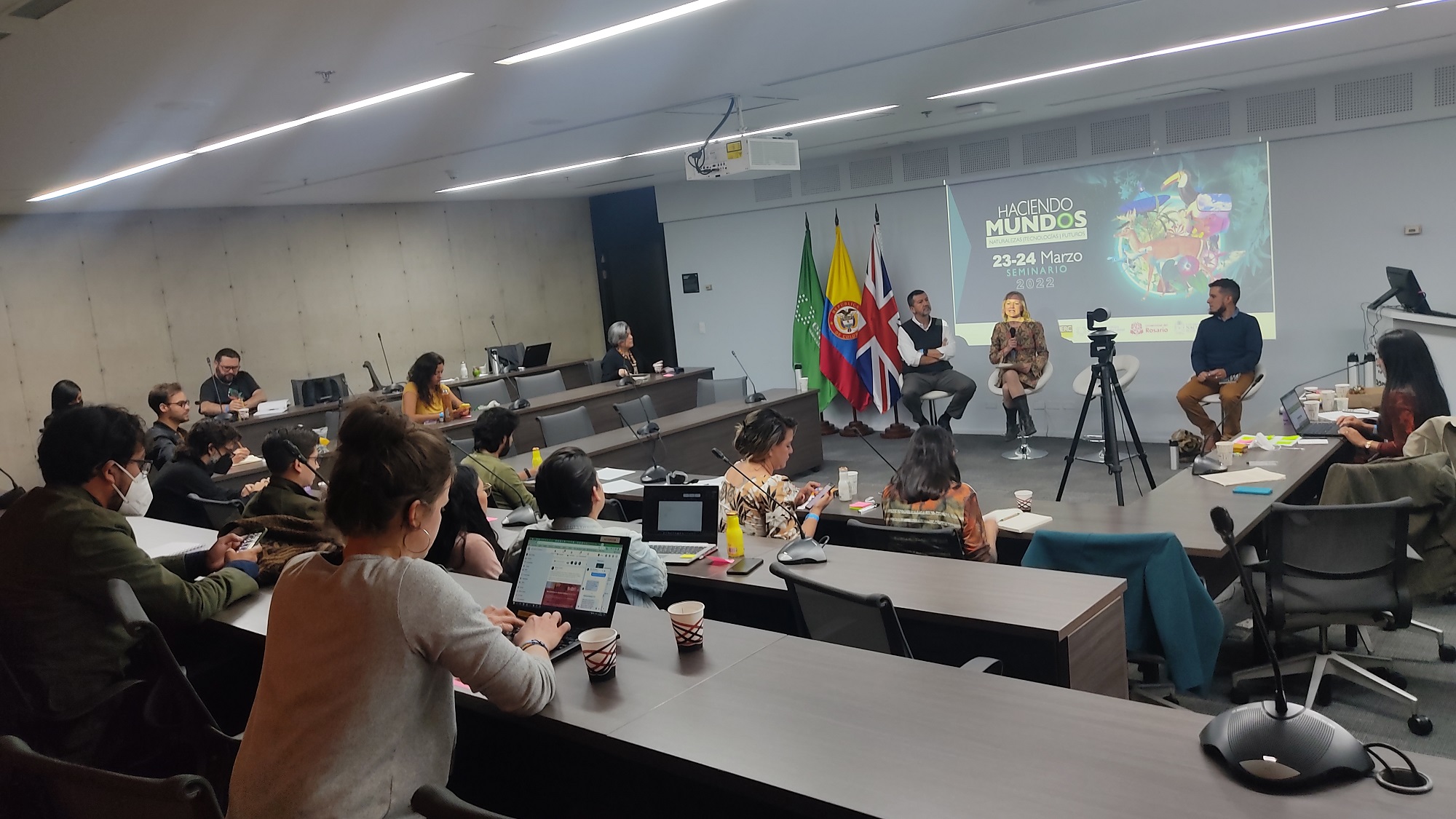
Conference: Extractivism, Post-extractivism and Rights of Nature. Rodrigo Botero (FCDS) and Carlos Olaya (DeJusticia)
As Arturo Escobar put it, we are witnessing the emergence of post constructivist political ecologies (2010), where in addition to discussing the problems of access, distribution and rights over natural resources, we now question the very notion of nature, allowing ourselves to consider that there are many ways of understanding, knowing and relating to biophysical processes, and that it is precisely by including these other nature’s relationalities in the political discussion that we will be able to seek innovative, creative and profound solutions to contemporary environmental crisis, extinction events, and ruination. These are problems that endanger the continuity of life itself and of the ontological worlds that inhabit the planet.
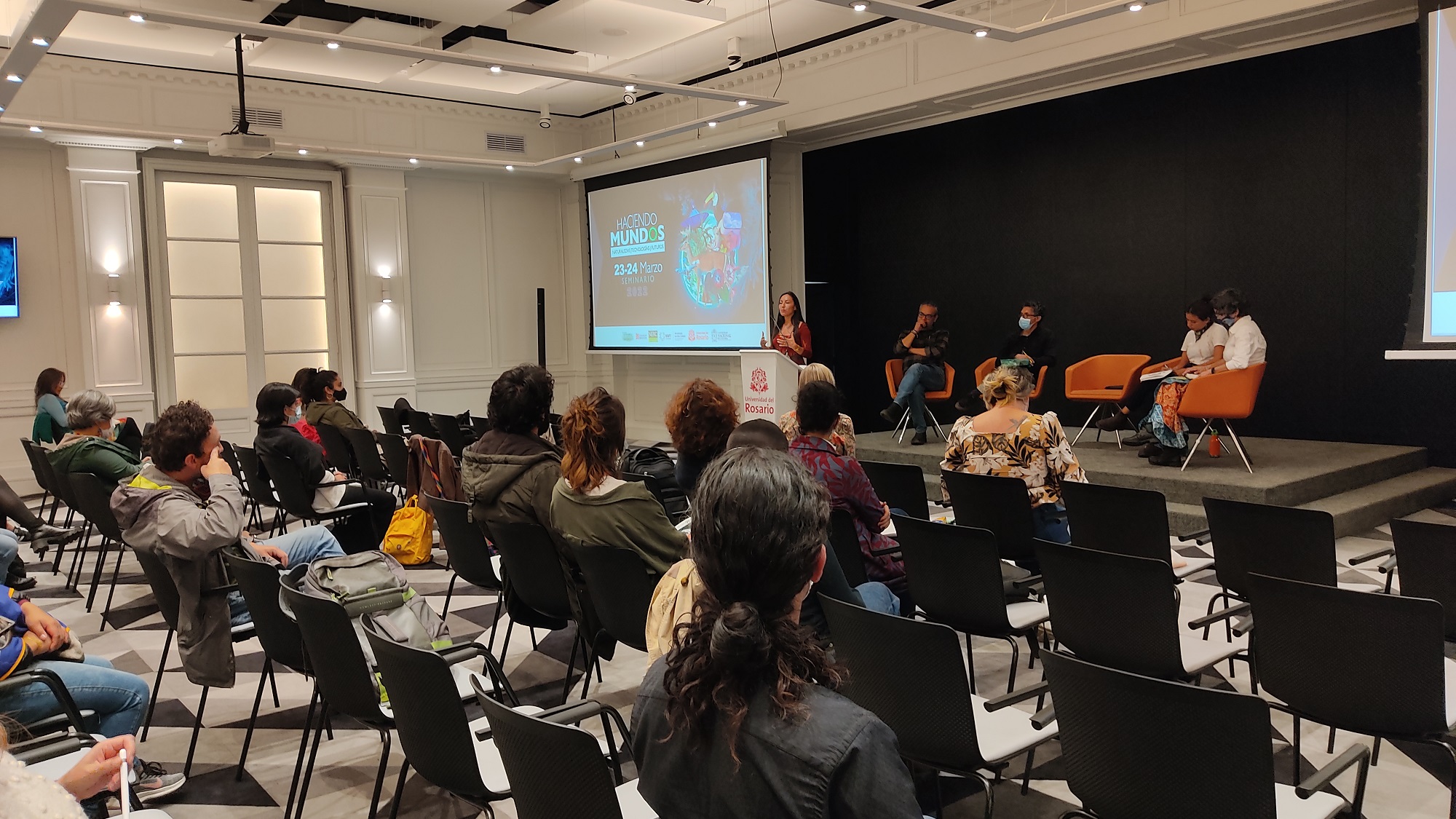
Conference: Gender, Intersectionality and More than Human Relationility. Astrid Ulloa, Clemencia Herrera, Gaia-Amazonas, Ana Aldana, Juan Camilo Cajigas.
Over the two days of the seminar, we talked about continuities and ruptures in the discussions on extractivism, postextractivism and rights of nature. We asked whether granting rights to nature — animals, ecosystems or biophysical entities — within modern Western legal frameworks, is a measure that enables the agency of these entities? Or was it perhaps necessary to rethink the logics of the modern state itself to incorporate the agencies that exceed modern humans? Here the place and question of the law itself became central.
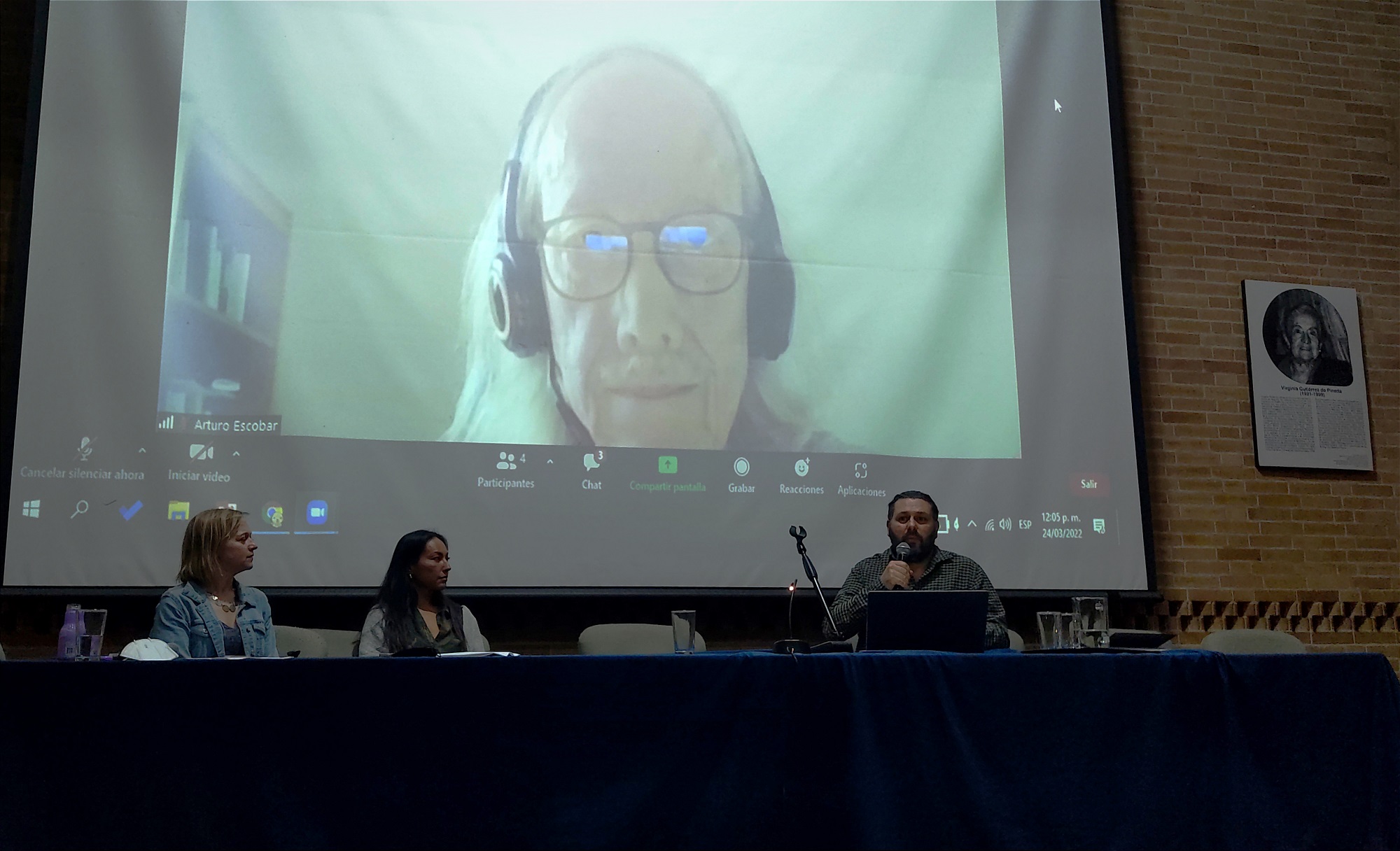
Conference Cyborg Nature, Drones and Technologies. Arturo Escobar, Naomi Millner, Monica Amador and Jaime Paneque-Galvez.
Another issue we addressed has to do with the practices of creation of worlds considering sex-gender differences, bodies, and intersectionality, since the way we formulate contemporary problems, and their possible solutions also emerge from the corporealities and the ways we generate bodies in place. We heard about concrete cases of Amazonian Indigenous women, and Indigenous Kamsa from Putumayo Colombia, where otherwise gendered corpo-realities and different practices of knowing the ‘worlds deployed from particular bodies-places’ articulate the crisis differently.
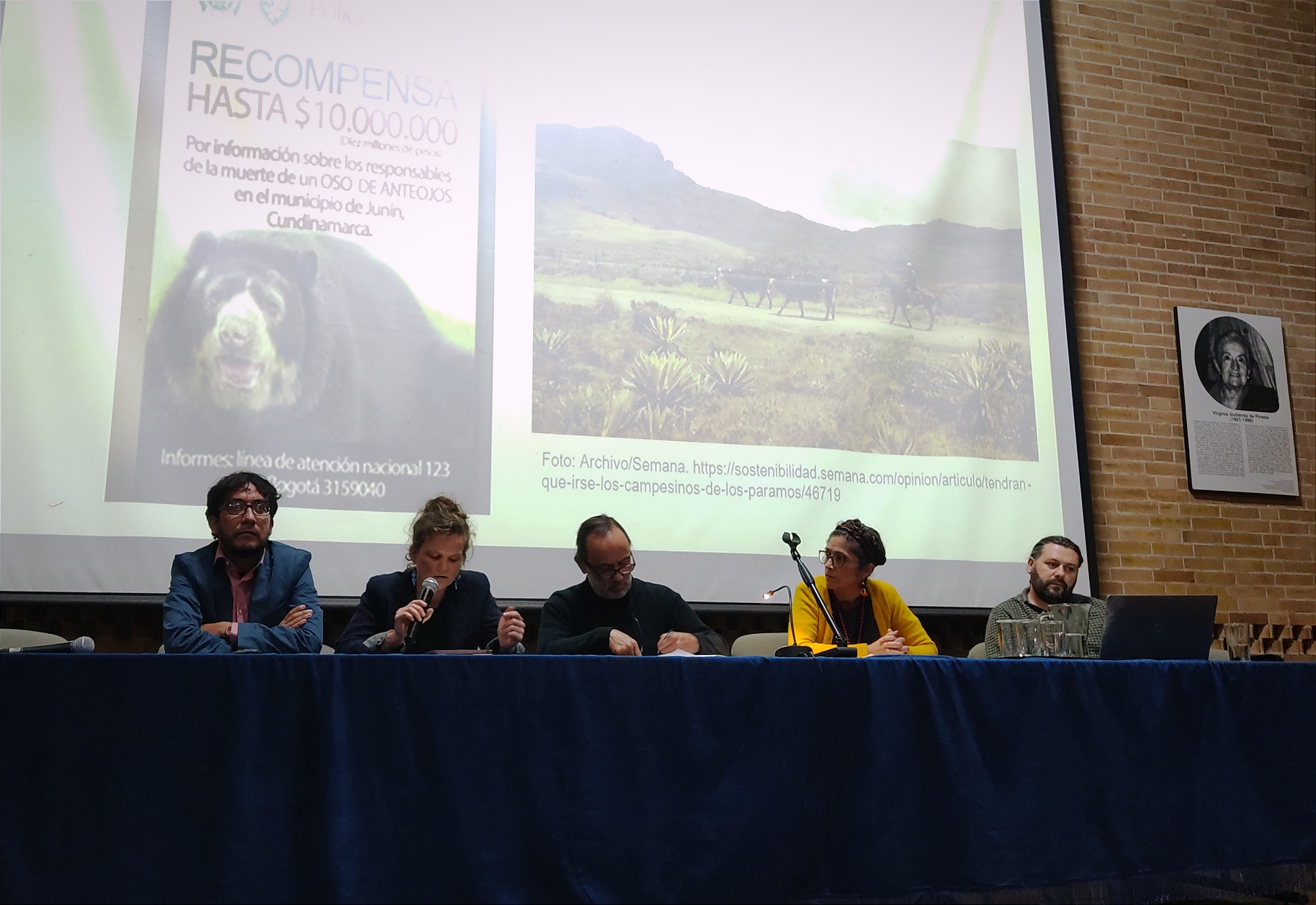
Conference: Human and Non Human Relationship and Colonial Histories. Santiago Martinez, Hanne Cottyn, Alfredo Gutierrez, Andrea Botero y Jaime Paneque-Galvez.
Technology was another topic we discussed in this seminar, thinking not of technology as neutral, but from its historical trajectory, created for particular purposes and in particular contexts, including military history. However, as the talk given by Monica Amador and Naomi Millner insisted, this history does not limit its capacities and possibilities. While technology meditates in the production of socio-natures, alternative uses and appropriations of technology, such as drones, might open up possibilities for restoration, territorial defense, and inclusion. We think of technology as interweaving of networks, infrastructures and assemblages with wide, but not unlimited possibilities; wider possibilities in which we can still intervene. This horizon is suggested through the figure proposed by Donna Haraway, the Cyborg (1991), an emblem of Cold War military techno-sociality, which she nevertheless reimagines occupied by feminist solidarities and plural and multiple ontological relationalities.
The seminar embodied a profoundly dialogical ethos, aiming to think and make visible the agency and materiality of non-humans, and diverse forms of knowledge. We designed the seminar together with the speakers, activists and professionals involved in the project and universities with we made the call. This led to the incorporation of a variety of methodologies, tools and voices in the format and structure of the two days. Space was established for broad and deep thinking, slow thinking, with room to experiment with new formats. In place of quick solutions, we collectively sought to think and rethink the problems, actors, agencies, places-bodies and technological mediations together.
We would like to thank Universidad EAN, Universidad del Rosario, Universidad Nacional and the University of Bristol for affording us the time, the space and the conditions that allow us to think and share these two days of seminar. We also extend our thanks to the people who participated in person and virtually, especially because in the midst of the difficulties of the COVID-19 pandemic, and with the challenge of the pandemic itself, it is imperative that we seek new ways to meet to think collectively.
We want to share with you the links of the round tables of our seminar so that you can listen and re-listen to them, and from different places be part of our network of thought.
References
Escobar, A (2010) Chaper:6 Post constructivist Political Ecologies in Redclift, M. R., Redclift, M., Woodgate, G., & Woodgate, G. The international handbook of environmental sociology (2nd ed.). Edward Elgar.
Haraway, D. J. (1991). Simians, cyborgs and women: the reinvention of nature. Free Association.